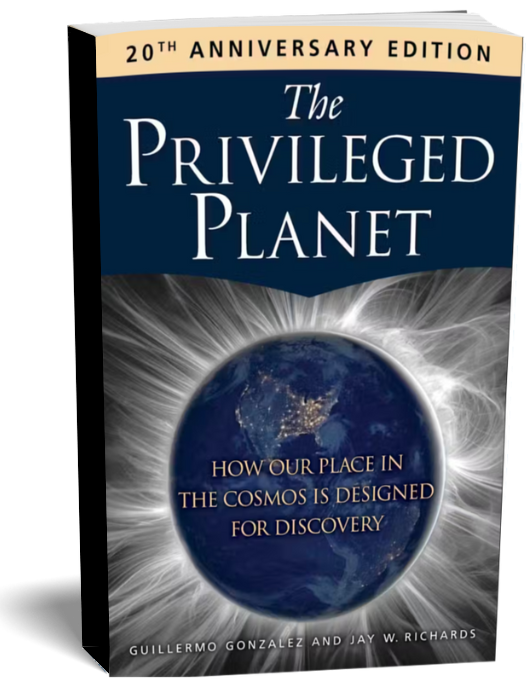
Ever talked with a book?
Have a conversation with The Privileged Planet with an advanced and knowledgeable LLM. Dig deeper on any subject covered in the book. Ask the chatbot how solar eclipses have aided scientific advancement. How are Earth’s mineral resources different from other planets? How does extraterrestrial life fit in? (Of course, all consequential answers from any LLM should be verified by other means.)
HOW OUR PLACE IN THE COSMOS
IS DESIGNED FOR DISCOVERY
Synopsis
The Provocative Classic The Privileged Planet in a Fully Revised, 20th Edition!
Are we just an accident of cosmic evolution? Is Earth a “lonely speck in the great enveloping cosmic dark” as the late Carl Sagan put it? Or is there more to the story? In this provocative book, Guillermo Gonzalez and Jay W. Richards marshal a staggering array of scientific evidence to counter the modern dogma that Earth is nothing more than the winner of a blind cosmic lottery.
Authors
Jay W. Richards
Senior Fellow at Discovery, Director of Devos Center at Heritage FoundationGuillermo Gonzalez
Senior Fellow, Center for Science and CultureReviews
Is our universe a blind concatenation of atoms, evolution a random walk across a meaningless landscape, and our sense of purpose a pathetic shield against a supremely indifferent world? Or does the universe and our place within it click into place, repeatedly? These starkly different views open up immense metaphysical and theological questions, and at least part of the answer must come from science and the unfolding triumphs of cosmology, astronomy, and evolution.
In a book of magnificent sweep and daring Guillermo Gonzalez and Jay Richards drive home the arguments that the old cliché of no place like home is eerily true of Earth. Not only that, but if the scientific method was to emerge anywhere, the Earth is about as suitable as you can get. Gonzalez and Richards have flung down the gauntlet. Let the debate begin; it is a question that involves us all.
Simon Conway Morris
Professor of Evolutionary Paleobiology, University of Cambridge
Author of Life’s Solution: Inevitable Humans in a Lonely Universe
This thoughtful, delightfully contrarian book will rile up those who believe the “Copernican principle” is an essential philosophical component of modern science. Is our universe designedly congenial to intelligent, observing life? Passionate advocates of the search for extraterrestrial intelligence (SETI) will find much to ponder in this carefully documented analysis.
Owen Gingerich
Harvard-Smithsonian Center for Astrophysics
Author of The Book Nobody Read: Chasing the Revolutions of Nicolaus Copernicus
Q&As
Q#1: Is the fact that we can see “perfect” solar eclipses related to our existence?
A: The Earth’s surface provides the best view of solar eclipses in the Solar System. The Earth’s surface is also the most habitable place in the Solar System. Is this coincidence just that? In The Privileged Planet, we argue that it isn’t. The conditions that make a planet habitable also make its inhabitants more likely to see solar eclipses.
Q#2: Is our existence related to the transparency of the atmosphere?
A: Atmospheres come in many forms, but not all allow for complex life or clear views of the wider universe. Complex life requires a certain type of atmosphere. It turns out that this same type of atmosphere provides a remarkably clear view of the near and distant universe. Complex, intelligent beings are unlikely to find themselves on a planet with an opaque atmosphere or deep in a murky ocean. We explain this relationship in detail in The Privileged Planet.
Q#3: Can life be based on any liquid substance, or is water somehow special?
A: Water is common on Earth’s surface, but one might suspect that on other planets, there are complex, intelligent beings that are not based on water, but liquid ammonia, methane, or nitrogen. But that’s very unlikely. As it turns out, water is endowed with life-support capacities lacking in other substances. Together these capacities make water the most anomalous compound known to science. In The Privileged Planet, we also explain how important water has been to the rise of science.
Q#4: Is Earth a data recorder?
A: A walk through a Redwood forest is like a walk through the Library of Congress. Trees, along with corals, polar ice, marine sediments, and lake sediments contain vast storehouses of detailed information about Earth’s past climate. Is this a typical feature of planets? On the contrary, we argue that, as planets go, Earth (or, more precisely, the Earth-Moon system) is a quite high fidelity recorder of the past.
Q#5: Is the appearance of the night sky related to our existence?
A: Not only is our atmosphere transparent, but we also enjoy dark nights. Several happy coincidences, from having a planet that rotates on its axis, to our location in the galaxy, to the age of the cosmos, conspire to make this possible. And those dark nights have been vital to many scientific discoveries, as we argue in The Privileged Planet.
Q#6: Why are there so many planets in the Solar System?
A: Isn’t just one planet (Earth) all we need? Doesn’t it seem like a waste of space and materials to have all those other barren worlds? Well, not if those worlds are players in the games of life and scientific discovery. In The Privileged Planet, we discuss how the other planets serve as Earth’s protectors while at the same time helping us in our quest to learn about the nature of the cosmos.
Q#7: Did Copernicus remove us from the center of the cosmos?
A: In most introductory astronomy textbooks and popular descriptions of the history of science, students are told that until Copernicus, the West believed that Earth and its human inhabitants viewed themselves as being in the most important place in the cosmos. Copernicus, we are told, demoted us by making Earth merely one of the planets. As it is usually presented, this popular story is mostly mythology rather than historical fact. In Pre-Copernican cosmology, the “center” of the cosmos meant something entirely different from what it is now taken to mean. We explain why in The Privileged Planet.
Learn More
HOW OUR PLACE IN THE COSMOS IS DESIGNED FOR DISCOVERY
